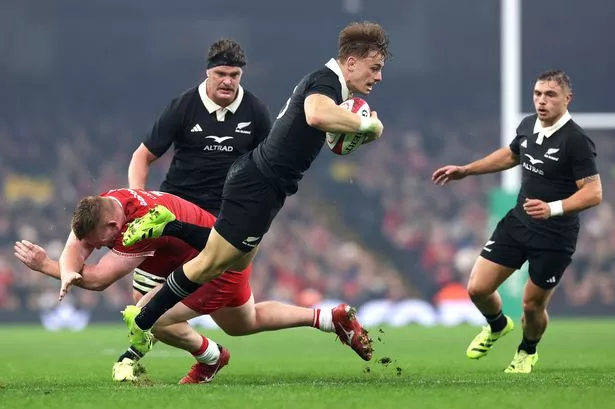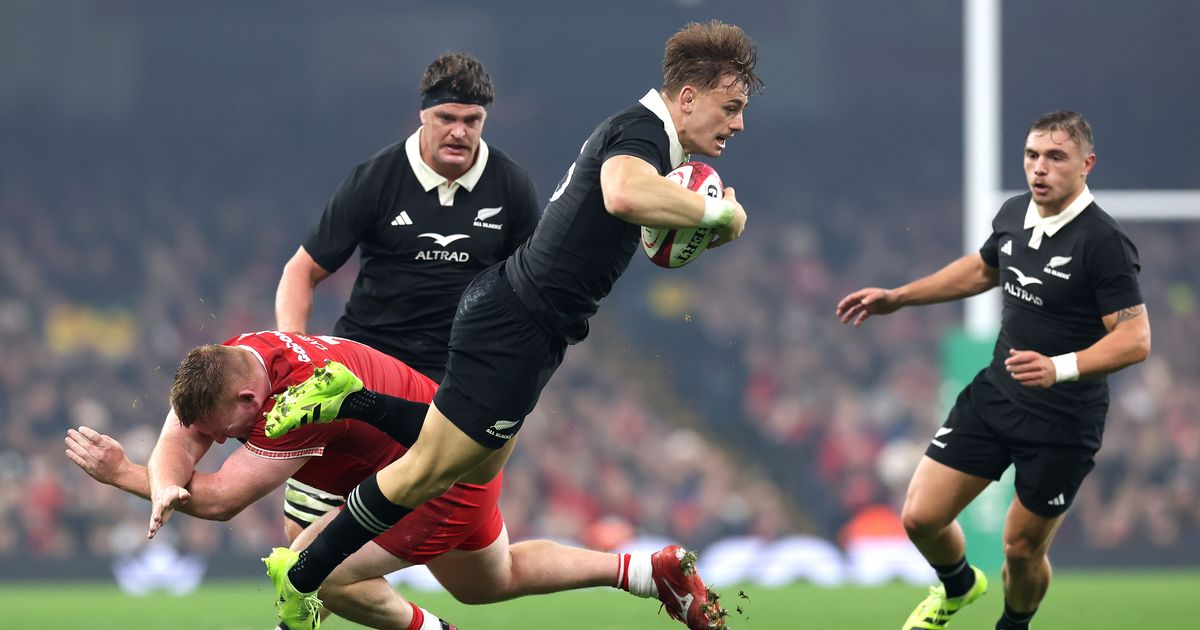Wales have conceded 127 points in just three games, with South Africa still to come to Cardiff Ruben Love breaks through to score against Wales(Image: Getty Images)
Ruben Love breaks through to score against Wales(Image: Getty Images)
Analysing Wales is a difficult task at the minute.
The benchmarks that used to exist are no longer there. There was once a time where conceding 52 points to Argentina and New Zealand either side of a one-point win over Japan would merit inquests and sackings.
That’s not where Welsh rugby is, anymore.
Steve Tandy finds himself three matches into a rebuild that will take years.
Welsh rugby has been allowed to rot so badly that we can barely see the top table of the world’s game, let alone dine at it. We haven’t even settled on the route back, let alone started down that path.
And so we’re left to pluck the positives from heavy defeats.
There are undoubtedly some green shoots.
Wales have crossed for 11 tries this autumn, with their attacking game far more fluid and clinical than the latter days of Warren Gatland’s second spell in charge.
Wales have spent on average two minutes less per game with the ball in attack in this autumn compared to the Six Nations, yet they have already managed more than the 10 tries they scored in that tournament.
And that was across five games, rather than the three Wales have played this autumn.
It is clear that, with Matt Sherratt in charge of the attack, Wales will look to develop an attacking game that, in the right areas of the pitch, can be clinical at Test level.
The early signs, perhaps unsurprising given Sherratt has been with Wales in some shape or form since halfway through the Six Nations, are promising.
It’s on the other side of the ball where Wales have struggled.
The headlines are bleak; 127 points conceded across three matches. The opposition have carried for, on average, 1,150 metres per match.
Through contact, Argentina, Japan and New Zealand have managed to gain an average of 580 metres.
Wales, quite simply, have struggled to stop teams getting over the gain line repeatedly.
They are defending more than they have done in previous campaigns.
Just as their average time in attack is down from the Six Nations, they’re spending two more minutes per match defending.
In just three of Wales’ 10 matches this year – Italy, Ireland and England in the Six Nations – have the opposition made more tackles than Wales over the course of the 80 minutes.
Averaging 155 tackles per match in the Six Nations, that worked out – on average – as just two more than their opponents over the course of the five games.
Content cannot be displayed without consent
Now, being made to make around 208 tackles a match, they tend to be making more than 85 tackles per match compared to their autumn opponents.
That’s a massive shift in defensive work.
Tandy, as he has done with previous sides, is putting a big emphasis on choke tackles to slow down the opposition.
Wales have had the odd breakdown threat from Jac Morgan and Alex Mann this autumn, but tackle choice has more been about holding up carries, rather than looking to create jackal opportunities.
This isn’t too much of a surprise. Japan spent most of the week in Cardiff preparing for choke tackles.
Given their lack of power, that might be the best way to go about things. However, there’s still plenty of tweaks to be made.
From the previous campaigns, they’re enjoying less possession and territory, while their discipline remains a concern – averaging 11 penalties per game.
That is inviting pressure onto Wales. Merely getting through 80 minutes without a card would go a long way to fixing matters.
Right now, though, there’s a desperation at times – with Wales a little overeager, understandably so, around the ruck area and offside line.
Looking at Wales’ defensive structure, most of the tries they’ve conceded haven’t been systematic errors, but rather individual ones.
The All Blacks, at times, got around Wales a little too easily, but that did come from the way their powerful forwards were able to make metres at will through the heart of the Welsh defence.
Little errors, like Rhys Carre being concerned about an inside ball on second phase and getting disconnected from Harri Deaves for Ruben Love’s score, while frustrating, are fixable.
A lot of the tries Wales have conceded this autumn have been self-inflicted. Argentina in particular was a masterclass of gifting the opposition soft tries.
Wales are currently working without a permanent, out-and-out defence coach.
Obviously, Tandy’s area of expertise is defence, but while he’s bringing in his own philosophy in that area, he’s the head coach and that comes with a lot more fires to put out.
Dan Lydiate is also there on an interim basis, but a permanent coach to work alongside Tandy is needed.
Wales are undeniably brave in defence and Tandy’s got the know-how, especially when he gets help, to improve Wales in this area.
Right now, though, they’re simply doing too much defending for their own good. Fixing other areas, like the aerial game and discipline, would relieve some pressure, but there’s no quick fix.
It’s hard to see things changing massively next week.
Follow all of our channels to ensure you stay up to date with the latest Welsh rugby news. Sign up to our free daily newsletter here and our WhatsApp channel here for all the breaking news.
You can also follow us on social media on our X account, Facebook, Instagram and TikTok.
For more exclusive stories and in-depth analysis, you can sign up for the Inside Welsh Rugby substack newsletter here.

